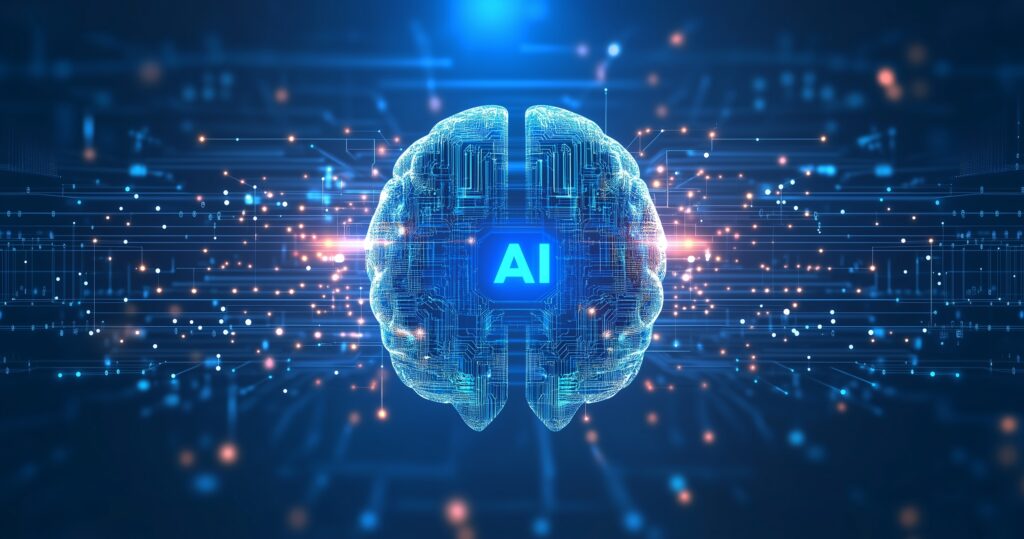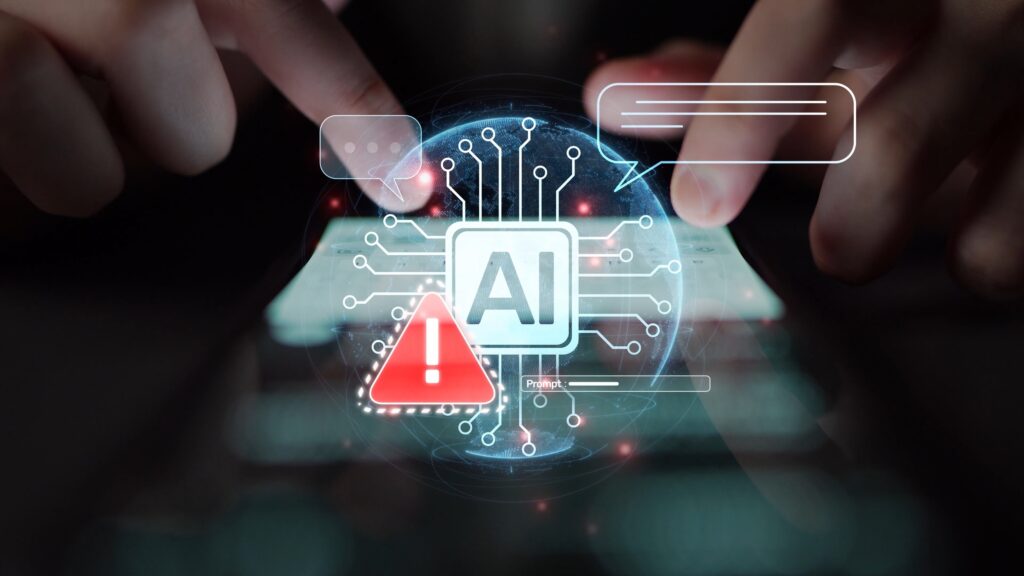The Role of AI Cybersecurity Solutions in Healthcare

Your Roadmap to Safeguarding Sensitive Multi-Cloud Data
AI Cybersecurity solutions are rapidly becoming essential as artificial intelligence (AI) reshapes healthcare innovation.
While AI offers powerful solutions for improving clinical trials, diagnostics, and operations, organizations adopting it must navigate a complex multi-cloud reality, leveraging tools from AWS, Azure, and GCP. This rapid expansion, however, introduces new security challenges that traditional methods can no longer support. Protecting PHI, research data, and intellectual property is more critical than ever.
This post will cover AI’s crucial role in healthcare cybersecurity, focusing on its necessity, how it manages multi-cloud risks, and best practices for security, compliance, and innovation.
Democratization of AI & Multi-Cloud Strategies
Not long ago, building any kind of data analysis solution in healthcare required an elite team of data scientists and developers. Today, the democratization of AI has made these tools accessible to a broader audience, eliminating the need for deep technical expertise to use them effectively. User-friendly platforms like ChatGPT, Claud, and Gemini, to name a few, have shown that AI is now a tool for everyone.
This shift empowers those closest to the problems—doctors, researchers, and clinicians—to drive technology initiatives and create solutions. When domain experts can build and experiment without deep technical skills, progress accelerates.
This democratization is pushing organizations into a multi-cloud reality. For years, many tech leaders preferred a single-cloud approach for its simplicity. However, different AI tools are often best suited for specific cloud providers, driving organizations to diversify. For example:
- Microsoft’s partnership with OpenAI made generative AI widely accessible.
- Google’s Vertex AI, with models like MedPaLM, is tailored for the language of healthcare.
- Amazon Web Services (AWS) offers a vast toolkit for builders with more technical skills.
To get the best results, healthcare organizations are using an “and” strategy, not an “or” strategy, combining the strengths of multiple cloud environments.
This multi-cloud approach enables A/B testing and routing tasks to the most efficient and cost-effective AI model, no matter which cloud it’s on.
How AI Innovations Transform Patient Care and Data Security
AI has moved beyond theory into real-world healthcare applications, amplifying the capabilities of healthcare professionals.
Here are just a few examples of how AI is advancing healthcare:
- Disease Detection and Diagnosis: AI tools can analyze medical imaging with precision that often matches or exceeds human radiologists, process lab results to flag concerns, and identify rare conditions. For example, ClearDATA customer Azra AI is pioneering AI in oncology care to help providers detect cancer earlier and optimize treatment decisions.
- Personalized Medicine: By analyzing genetic information and medical history, AI systems can recommend optimal drug dosages, predict treatment responses, and identify potential adverse reactions.
- Drug Discovery and Development: AI algorithms can sift through vast datasets of chemical compounds and biological targets to accelerate the identification of new drugs and therapies, significantly reducing the time and cost associated with traditional R&D.
- Operational Efficiency: AI helps optimize hospital operations by managing appointment scheduling, predicting patient no-shows, and streamlining administrative tasks, leading to better resource allocation and reduced wait times.
- Data Security: AI helps protect sensitive patient information by monitoring networks for unusual activity, detecting potential breaches, and assessing compliance risks across all data sources.
Now, let’s explore AI and security—how AI enhances security and how we secure the workloads it supports.
What Are AI Cybersecurity Solutions?
We just discussed the ways that AI is advancing healthcare. Now, let’s take a look at what role artificial intelligence plays in healthcare.
In healthcare, AI cybersecurity refers to the use of artificial intelligence technologies to protect computer systems, networks, and data from cyber threats. However, it’s important to distinguish between two key aspects:
First, let’s look at AI-enabled security tools. These are solutions that use AI and machine learning (ML) to detect, predict, and respond to cyber threats. For example, an AI system can analyze network traffic to identify unusual patterns that might indicate a ransomware attack.
Next, and equally important, is securing AI workloads. This involves protecting the AI models, and the data they use, from threats. This is vital, especially in healthcare, where organizations use this data for cancer research, diagnoses, and precision medicine.
Just like any other software, AI systems can be vulnerable to attacks, such as data poisoning or model evasion, which can compromise their integrity and lead to incorrect or harmful outcomes.
Why Healthcare Needs AI Cybersecurity Solutions
The growing adoption of AI has transformed multi-cloud environments and has advanced technology to allow for better patient outcomes and groundbreaking research.
Conversely, it introduces new risks that can expand an organization’s attack surface:
- Shadow AI: Employees using unauthorized AI tools can accidentally expose sensitive data like PHI to unsecured third-party models. This creates security blind spots.
- AI-fueled ransomware: Ransomware is the number one attack vector for healthcare, and AI is making it more dangerous with sophisticated phishing campaigns, adaptive malware that bypasses security systems, and deepfakes used in social engineering attacks.
- Accelerated attacks: AI automates and speeds up attacks, making them more scalable and harder to stop.
How to Harness AI and Manage Security Risks in Multi-Cloud Environments
Unlike traditional security systems that rely on static rules, AI continuously learns and adapts to new patterns of behavior. This is particularly valuable in healthcare, where the volume and value of data demand an agile security approach.
AI enhances cybersecurity in several ways:
- Automated Threat Detection: AI-powered tools monitor network activity 24/7, identifying suspicious behaviors like abnormal data transfers that may indicate malicious activity. This drastically reduces response times.
- AI Network Security: AI strengthens network security by identifying vulnerabilities across all endpoints, including medical equipment, administrative systems, and patient portals.
- AI Incident Response: In the event of a breach, AI can assist by isolating compromised systems, containing threats, and initiating remediation, helping healthcare providers maintain continuity.
- Predictive Analytics: By analyzing historical data, AI can forecast vulnerabilities and recommend proactive security measures.
- Enhanced Data Encryption: AI can automatically apply advanced encryption algorithms to secure sensitive healthcare information, adapting protocols based on emerging threats.
AI can mitigate a range of common threats, including ransomware, phishing attacks, insider threats, and vulnerabilities in connected IoT devices.
Governing Shadow AI: Multi-Cloud Compliance and Risk Management
The unregulated adoption of AI has led to a growing challenge: Shadow AI. This is the unauthorized use of AI tools within an organization, often arising when employees bypass formal processes to address immediate needs.
Shadow AI is dangerous for several reasons:
- Data Security Risks: It often bypasses cybersecurity oversight, creating vulnerabilities for data breaches, which is especially risky when dealing with PHI.
- Compliance Challenges: It operates outside of regulated systems, potentially exposing organizations to legal and financial liabilities under regulations like HIPAA, HITRUST, and GDPR.
- Operational Inefficiency: It leads to fragmented efforts, higher costs, and conflicting insights across departments.
To mitigate these risks, organizations must establish a unified AI governance structure. This includes reinforcing fundamentals like multi-factor authentication (MFA), role-based access controls, and secure data storage. Never underestimate the power of a good employee education program, and clearly define sanctioned AI tools for your organization.
Enabling Innovation While Staying Secure
The goal is to let your smartest people drive innovation as fast as possible, focused on the road ahead, while a robust security framework acts as the safety system. This requires a comprehensive multi-cloud security approach that is secure, compliant, and resilient.
Your organization should:
- Ensure Unified Visibility: See all workloads and data flows, regardless of the cloud they reside in.
- Enforce Consistent Controls: Apply security policies uniformly across all environments.
- Automate Compliance: Continuously monitor for compliance with regulations like HIPAA.
- Leverage Cloud Detection & Response: Use Managed Detection and Response (MDR) services to identify and mitigate threats before they cause damage.
By providing a secure foundation, you can let teams innovate safely. Think of it as putting guardrails on the innovation highway.
Protecting Data and Utilizing AI Amid Regulatory Shifts
AI regulations are quickly changing. Healthcare organizations must keep up with new regulations like the EU AI Act and HHS AI guidance, while still following existing ones such as HIPAA and GDPR.
Providers must align with ACA §1557 and ONC HTI-1 for clinical AI, plus HIPAA. Payers need human oversight for AI coverage decisions per CMS. Pharma and life sciences are guided by EMA (EU) and FDA for AI validation in trials. Health-tech vendors navigate ONC HTI-1, FDA/MHRA, HITRUST, and the EU AI Act.
Here’s a summary of some AI regulations that are emerging along with AI technology within the US at the federal level.
- HIPAA/HITECH (OCR enforcement + tracking-tech guidance): HIPAA’s privacy and security rules apply to Protected Health Information (PHI), even when using AI. The OCR’s 2024 update on web and app tracking emphasizes that exposing PHI through pixels or cookies triggers HIPAA obligations. Non-compliance risks Civil Monetary Penalties, corrective action plans, and potential litigation.
- ACA §1557 Nondiscrimination Final Rule (2024–2025): Requires covered entities to prevent discrimination when using “patient care decision support tools” (includes AI/algorithms); take reasonable steps to mitigate bias. Your organization should be aware of compliance milestones to continue through 2025.
- ONC HTI-1 Final Rule (DSI transparency + info blocking updates): Certified EHR/health IT must expose provenance, training/evidence attributes, performance, limitations, and fairness/mitigation details for decision-support interventions that include AI/ML and effective dates will continue into 2025.
- ONC HTI-2 / TEFCA updates (2024–2025): This update further changes information-blocking regulations and officially recognizes TEFCA’s “manner” exception, affecting how AI-powered systems exchange electronic health information through Qualified Health Information Networks (QHINs).
- CMS Medicare Advantage FAQ on AI (Feb 2024): Plans may use AI/algorithms to assist coverage decisions, but final determinations must comply with medical-necessity rules and cannot rely solely on AI. Healthcare organizations should expect audits/sanctions for misuse.
- CMS Interoperability & Prior Authorization Final Rule (CMS-0057-F): Requires payers to increase PA transparency, speed decisions, and enable FHIR APIs, which is relevant if AI is used in either utilization management or PA workflows. Phased deadlines are expected to run through 2027.
- The FDA’s framework for regulating AI/ML-enabled Software as a Medical Device (SaMD) and Software in a Medical Device (SiMD): focuses on ensuring the safety and effectiveness of these devices throughout their lifecycle, from pre-market review to post-market performance monitoring.
- PCCP guidance (Predetermined Change Control Plans): Enables iterative updates to AI models post-market while maintaining safety/effectiveness.
- AI/ML SaMD program + GMLP principles (with Health Canada & MHRA): Guide data management, training, transparency, and monitoring across lifecycle.
- 21 CFR Part 11 (electronic records/signatures): Remains in force for clinical investigations and quality systems used around AI (e.g., training/validation data pipelines, e-signatures).
- NIST AI Risk Management Framework (AI RMF 1.0): This is voluntary, but increasingly referenced; defines governance/controls for trustworthy AI (map-measure-manage). Often used to operationalize risk management around HIPAA/FDA/§1557 obligations. Your clients may ask about NIST certification and compliance.
Best Practices for AI Cybersecurity Solutions in Healthcare
Implementing AI for cybersecurity offers several benefits, including enhanced efficiency, improved accuracy, and real-time response.
To achieve this, healthcare organizations should follow best practices for securing their AI initiatives.
- Data Encryption and IAM: Implement robust data encryption for data at rest and in transit. Use strong Identity and Access Management (IAM) controls, including MFA and role-based access, to ensure only authorized personnel can access sensitive data and AI models.
- Audit Logging and Monitoring: Continuously monitor AI workloads for anomalous behavior. Maintain detailed audit logs of all activities related to your AI systems, which is crucial for incident response and regulatory compliance.
- AI/ML Model Lifecycle Management: Secure your AI models throughout their entire lifecycle, from data collection and training to deployment and monitoring. This includes protecting against data poisoning, model evasion, and other attacks that target the ML pipeline.
How ClearDATA Supports Healthcare AI Initiatives
The democratization of AI and the rise of multi-cloud are driving innovation, but navigating AI cloud security—particularly in healthcare—requires a specialized approach to prevent breaches that could endanger patient safety and lead to hefty HIPAA fines.
ClearDATA enables you to scale your use of AI in the cloud with confidence. Our solutions are built to ensure your healthcare cloud infrastructure remains secure and compliant, so you can focus on what truly matters—innovation and patient care.
ClearDATA’s mission is to help you build that secure foundation. We provide the guardrails that allow you to focus on what truly matters—whether that’s curing cancer, developing life-saving medical equipment, or transforming your industry.
How do we do it?
Our team of experts and managed services, plus our one-of-a-kind cloud security posture management (CSPM) platform, gives you everything you need to protect PHI in the cloud Our CyberHealth™ platform leverages hundreds of safeguards aligned with frameworks like HIPAA, HITRUST, NIST, and GDPR to identify and neutralize threats.
We provide real-time, proactive protection that helps you combat AI-fueled ransomware with an intelligent security posture.
Let us handle the complexities of securing your multi-cloud environment, so you can focus on pushing the boundaries of what’s possible and solving humanity’s greatest challenges.
Take the Next Step in Securing Your AI Innovations in the Cloud


